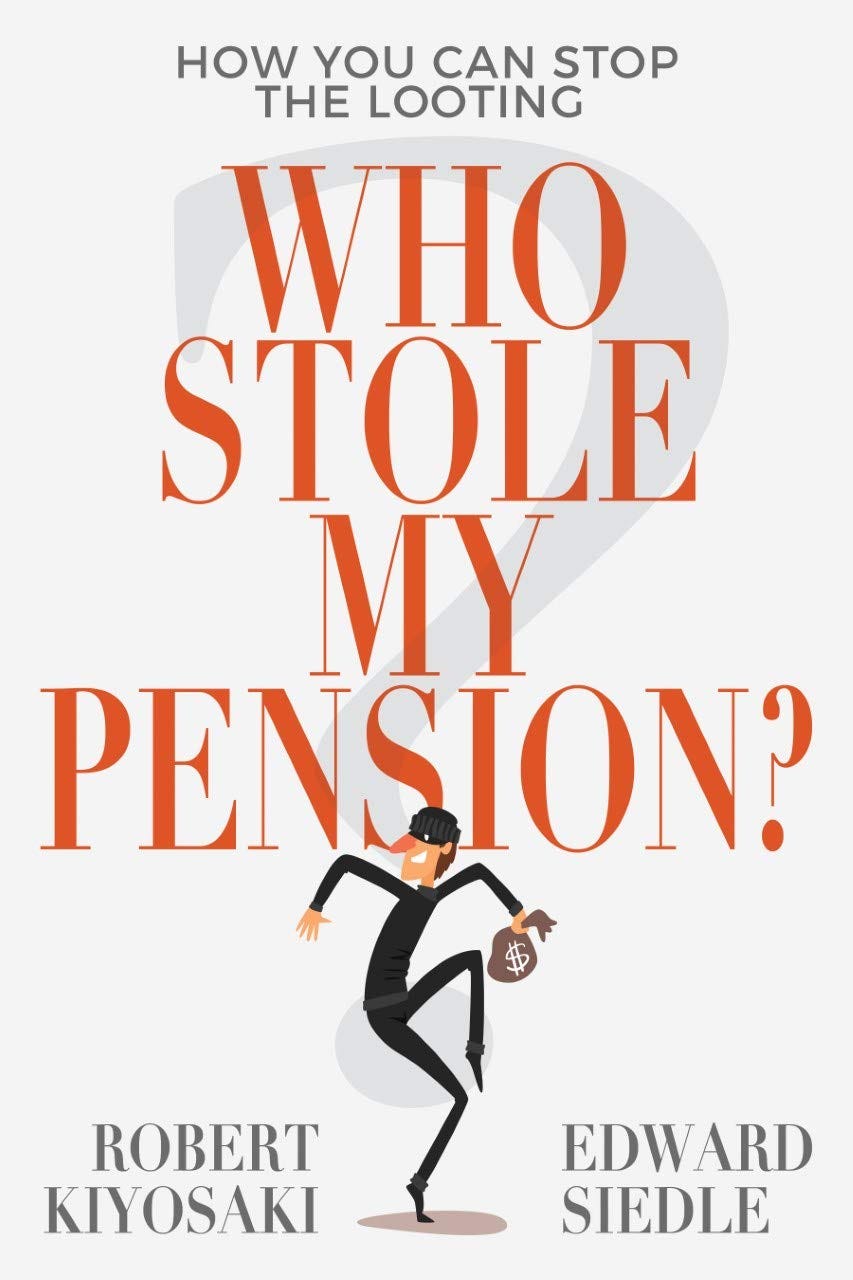Big Lies At The Tiniest State Pension
Pension warriors fed up with a secrecy scheme at the Employee Retirement System of Rhode Island filed a public request that immediately exposed big lies.

A group of state pensioners fed up with a secrecy scheme at the Employee Retirement System of Rhode Island devised by former-state General Treasurer, now U.S. Secretary of Commerce Gina Raimondo a decade ago (and continued by her successor Seth Magaziner), recently decided they wanted answers about how their retirement savings were invested.
They looked to hire a lawyer to bring a public records lawsuit on their behalf which could expose potential mismanagement of the pension to public scrutiny. They rightly figured that they had the right to know—after all, it was their money. This was a straightforward matter any junior lawyer could initially handle, but one, they learned, no Rhode Island attorney wanted to touch—regardless of their willingness to pay the legal fee in advance.
The lawyer they eventually hired was Terry Mutchler of the Obermayer law firm in Philadelphia, who is Chair of the firm’s Transparency & Public Data Practice and Founding Executive Director of the Pennsylvania Office of Open Records. Mutchler sent the Access for Public Records Act request on January 20, seeking the prospectus and private placement memo, non-disclosure agreements and side letter and investment manager agreements pertaining to the pension, among other requests.
On February 3, General Treasurer James Diossa’s office rejected Mutchler's request for “prospectus, private placement memorandum, and offering document(s) provided to ERSRI with respect to each Alternative investment” — along with multiple others.
“In response to part 1 [sic] your request, the listed documents are not public record and have been withheld pursuant to R.I. Gen. Laws 38-2-2(4)(B) to protect proprietary /confidential trade secrets and/or commercial or financial information obtained from a person, firm or corporation that is of a privileged or confidential nature and or no portion of the documents or records contains reasonable segregable information that is releasable,” according to Diossa's Public Records Office in its response.
“This is one the most critical public records requests I’ve ever made,” Mutchler told online news source GoLocalProv, calling the response from Diossa to her five-part request for transparency in pension management fees “wholly inadequate.”
Big Lie #1: Prospectuses Widely Distributed Globally To Millions of Investors Are “Trade Secrets”
To be clear, the documents the participants requested are required, under U.S. and foreign securities laws to be provided to all investors. For each fund in which the pension invested, thousands of prospectuses and other offering materials are written, printed and distributed to potential investors globally.
If you’re a wealthy investor, Wall Street will happily provide you with these documents.
According to Diossa’s reasoning, the only investors who should not be allowed to see these investment documents are Rhode Island state workers—persons of limited wealth and resources—whose retirement security is at risk. Contrary to federal securities regulators, Diossa’s reckless advice to Rhode Island pensioners seems to be:
“Do not read the prospectus before you invest your hard-earned savings.”
Raimondo, Magaziner and now Diossa’s views on transparency beg the question: How can information broadly distributed globally to thousands of investors be considered a “trade secret?” Imagine if the Coca-Cola Company stood on a street corner, handed out its secret recipe to the world and then tried to claim it was entitled to trade secret protection. It makes no sense.

Who decided, as a legal matter, that investment prospectuses are so riddled with bona fide trade secrets that the documents—indeed not even a portion of the documents—can be released to pensioners whose retirement savings are at risk?
Big Lie #2 So-Called Transparency Agreements That, In Reality, Ensure Secrecy
The pension participants received almost none of the documents they requested.
However, among those provided were numerous so-called Transparency in Government Agreements drafted by the pension and signed by Wall Street money managers hired to manage pension assets. These Agreements were part of what then-Treasurer Magaziner heralded as a landmark proposal to increase transparency at the state’s pension fund.
So, do these Agreements provide much needed additional transparency, as Magaziner promised?
Hardly.
Much like Gina Raimondo’s misleading “Pension Reform” (more aptly named a “wealth transfer”) which slashed workers’ retirement benefits only to pay Wall Street billionaires exponentially greater fees, Magaziner’s so-called Transparency Agreements, in reality, involved the pension gratuitously agreeing to permit Wall Street to withhold from public scrutiny the most important information related to its riskiest, costliest investments. Magaziner’s Transparency Agreements should more appropriately be called Secrecy In Government Agreements.

In an interview with International Business Times at the time, Magaziner himself admitted that his transparency initiative did not extend to releasing the full text of agreements between the state and private financial firms that manage Rhode Island pension money.
To the contrary, Magaziner’s Transparency Agreements provide that while the investment firms acknowledge that ERSRI is subject to ARPA and that information related to these investments may constitute public records subject to the public access and disclosure requirements of ARPA, information provided in connection with the investments will (emphasis added) contain trade secrets and commercial or financial information that is privileged and confidential and is accordingly not a public record under ARPA.
So, rather than require Wall Street to agree to be fully transparent in handling public pension assets prior to allocating assets—rather than presume all information related to public monies is subject to public scrutiny—the agreements concede the most important investment information is not subject to public scrutiny.
Rather than make any money manager who wants to withhold information from the public assert and publicly defend his right to do so, Magaziner as the chief fiduciary of the pension let them off the hook—presuming that the most damning information is not a “public record” under ARPA.
A prudent fiduciary to a pension would have done the exact opposite: told Wall Street that all public pension investments must be subject to public scrutiny, in order to protect the public. Any Wall Street firm unwilling to submit to such scrutiny must be excluded from consideration.
Magaziner’s weak Transparency Agreements legitimize secrecy and protect Wall Street, not Main Street.
Big Lie #3: The Bogus “Back to Basics” Scheme
In 2013, I conducted my first forensic investigation of the state pension, commissioned by AFSCME Council 94. The investigation revealed that Gina Raimondo had steered pension assets into costly, speculative Wall Street hedge funds which, I predicted, would significantly underperform. And underperform they did—resulting in over $500 million in losses. That’s a massive loss for a tiny state’s pension.

Prior to Raimondo’s costly hedge fund gamble, disclosed pension expenses amounted to approximately $11 million annually.
As I noted in my 2013 report, as a result of loading up on hedge funds, the pension’s total investment expenses “may already, or in the near future, amount to a staggering almost $100 million annually— an amount far in excess of the $5 million cost of conservatively indexing or passively managing the Fund’s assets.” So, under Raimondo, investment fees paid to her pals on Wall Street grew a staggering 10-fold.
In 2016, newly-elected Treasurer Magaziner announced a new "Back to Basics" investment strategy for the Rhode Island pension fund.
Among the changes recommended by Magaziner was a significant reduction in the state's investments in hedge funds—seemingly, but not expressly repudiating his mentor, Raimondo. Under the "Back to Basics" plan, the state would reduce its investment in hedge fund strategies by more than $500 million over the next two years, and reallocate these funds to supposedly more traditional asset classes.
Said Magaziner, "Our 'Back to Basics' approach will improve returns through common sense investments that have proven they can deliver growth and stability."
"With pension costs comprising a large percentage of state and local budgets, the stronger performance projected under our 'Back to Basics' strategy can save millions for taxpayers and strengthen retirement security for our public employees."
According to Magaziner, “under Back to Basics, a majority of the pension fund will be invested in strategies designed to produce strong returns over time. These growth and income strategies mainly consist of low-fee index funds (emphasis added). The rest of the portfolio will be invested in assets designed to protect the pension system against market risks such as inflation and volatility.”
Contrary to representations by Magaziner, his “Back to Basics” plan did not move more funds into traditional asset classes, such as index funds, reducing pension costs. Had low cost index funds been embraced, investment expenses would have plummeted back down to pre-Raimondo levels, say $5-$11 million.
Instead, Magaziner’s misleading scheme rewarded Wall Street more handsomely than ever. Disclosed fees further skyrocketed from $85 million to $188 million in 2021.
Let me emphasize: Over the past decade—since I began my investigations into ERSRI—investment expenses have soared from $11 million to $188 million!
That’s mind-blowing excessive growth in expenses—paid for by Rhode Island pension participants’ Cost of Living Adjustments. Magaziner’s “Back to Basics” really is more aptly named “Ever-More Gluttonous Wall Street Excess.”
As recently noted in Jacobin:
“The schemes backed by Rhode Island general treasurer Seth Magaziner delivered subpar returns for teachers, firefighters, and other public sector workers, but they generated huge profits for the financial sector that has now dumped more than $200,000 into his congressional campaign.”
If the participants’ public records requests are eventually honored (which will undoubtedly require litigation) and expert forensic analysis of pension investment documents—public and secret documents—is undertaken, I predict Rhode Islanders will be shocked to discover, once again, that the state pension continues to be grossly mismanaged. Workers’ retirement savings continue to be invested in a manner that benefits local politicians and their deep-pocketed friends on Wall Street—in complete disregard to the best interests of the participants. Management of the pension has only gotten worse over the years and absent radical intervention the fleecing will continue.
As I advise in my book, Who Stole My Pension?, with respect to complex pension matters, “Investigate before you negotiate, litigate or legislate.” The time to investigate is now.



